Our in-house finance brokers are former bankers who help general practitioners and primary care specialists raise the finance they need to build and grow their business. You will most likely need different forms of funding to support for primary care business, ranging from buying into a GP practice, refurbishment projects, office space, new equipment or simply to pay your tax bill.
Getting the right financial solutions is essential for you to operate your practice to the best of its ability. We help GPs find the best finance solutions to their needs.
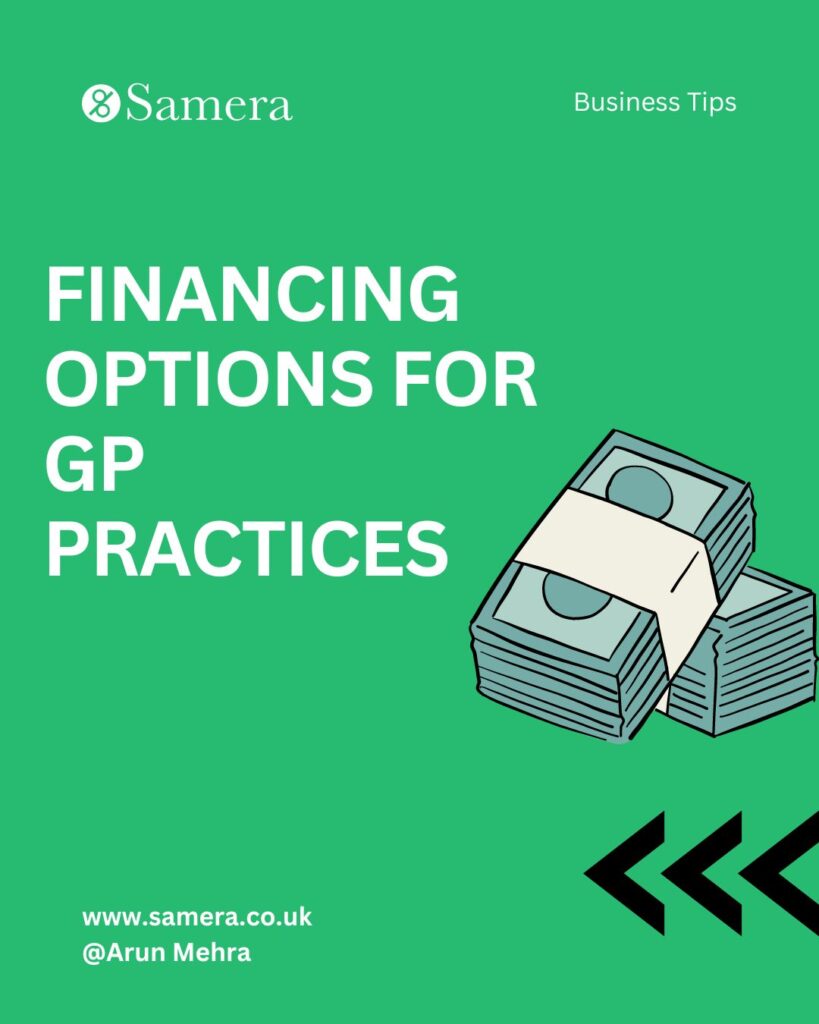
Finance options for GPs
Funding to buy an existing medical practice
You can either buy a GP practice outright or you can buy into an existing practice as a partner. Both of these options require significant funding, as well as a lot of in-depth research carried out by yourself or your team.
This research needs to include the performance of the business if it is an already existing practice and understand its current value as a business, or of the premises alone. The location is everything when it comes to how successful your business will be.
The patient base, the premises and any existing equipment that may be there, as well as the value of any NHS contracts, need to be both assessed and understood before you can begin the process of buying your GP practice.

Contact us to find out more
We can help you arrange the type of finance that will be best suited to you and your business. The two main types of loans that may be useful to you are either a Secured Loan or a Partner Equity Loan.
A secured loan is one answer, with the security of this loan being the practice itself. Partner equity loans are the best option if you are thinking of buying into an already existing larger practice as a partner or a buy-out for an existing partner who may be retiring.
Buy-in and Buy-out finance can also be a great option for you as it can accommodate the challenges of buying in and out of a GP practice, as it is funding tailored to help you make full use of the opportunity.
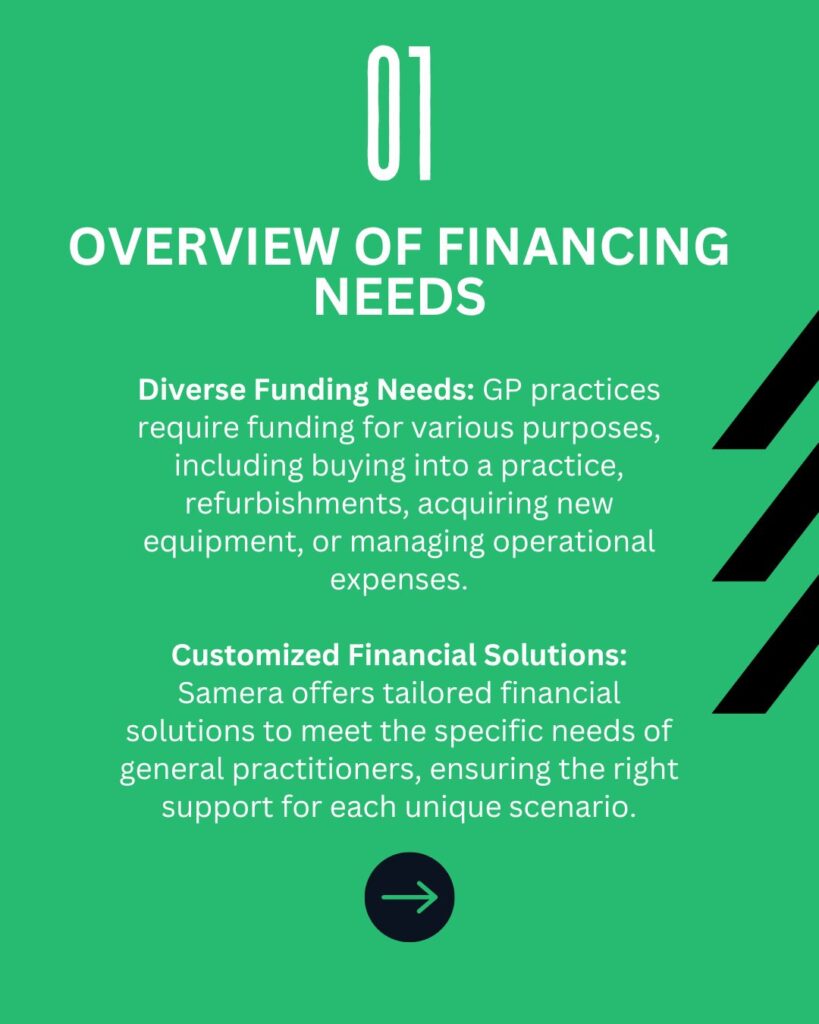
Becoming a partner in your GP practice
If you have been working in an existing GP practice for a number of years, you may consider becoming a partner at your surgery.
Don’t be concerned, most lenders are keen to lend finance for GPs for the buy-in loan that you will require, and lenders are not generally seeking additional security to secure the facilities they will lend on an unsecured basis
There are normally two situations when you will be offered the chance to buy into a practice as a partner.
- An existing partner is retiring/leaving and wants to sell their share of the partnership
- The existing partners would like to bring a new partner in and they will be willing to reduce their current ownership share so you can buy-in.
Either scenario is acceptable to lenders who are used to providing finance for GPs.
Click here to know more about 3 main ways to raise finance.
Buy-in loans
Most doctors own the doctor’s surgery where they are based as GPs and can’t sell the goodwill of the practice, so buy-in loans are normally calculated on a percentage of the freehold owned by the partnership.
Click here to avail our services on acquisition finance.
The partners will all need to agree the percentage that you will need to purchase (most partners would all have an equal ownership share of the practice). Based on a partnership of 4 GP’s with all partners having a 25% ownership and the freehold being valued at £1m, the buy-in amount needed would be £250k.
The freehold value would need to be confirmed by an independent valuer and all the partners must agree to the final buy-in figure.
The majority of buy-in loans agreed are on an unsecured basis, but you can offer additional security if you wanted to secure a lower interest rate. That being said, most lenders will be comfortable funding 100% of the buy-in amount totally unsecured.
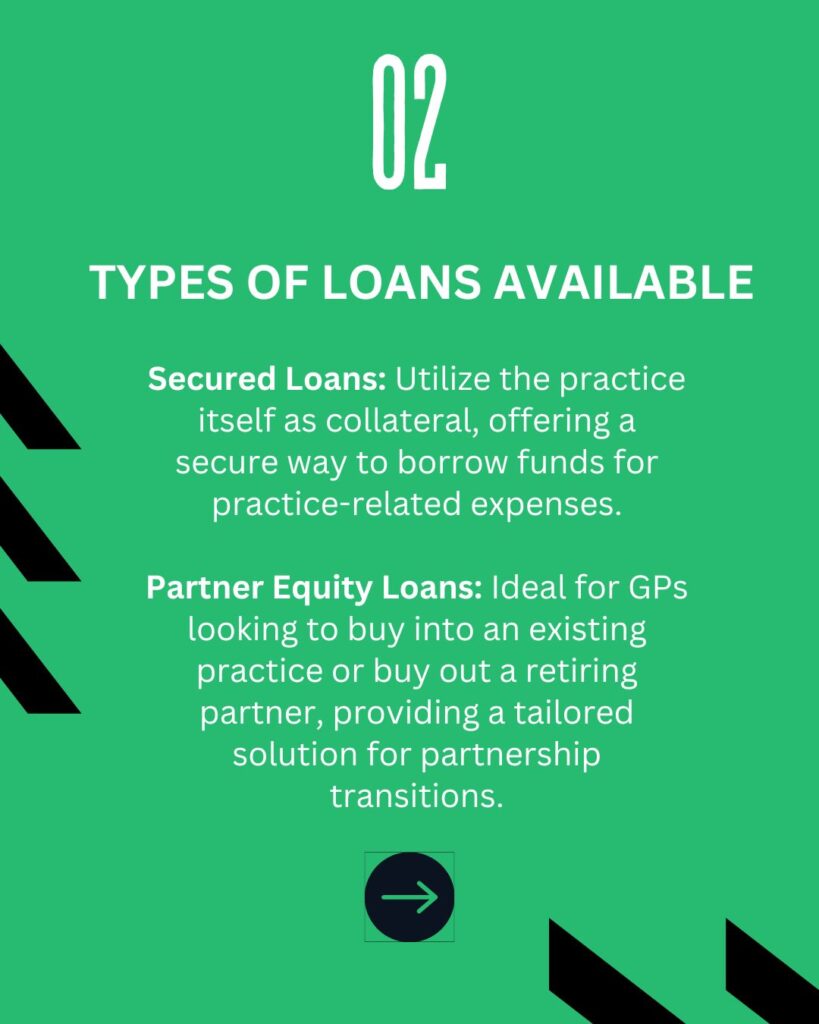
Click here to read about a guide to acquisition finance
How long is the loan term?
Buy-in loans are normally termed over 15-20 years. Some banks will allow you to make lump sum repayments with no charge, which can help reduce the term and allow you to repay the loan earlier if that is your plan.
Click here to watch our webinar on how you can obtain loans after COVID-19
The next question would be…
How do you pay for the loan?
Most partners earn more than a salaried GP. As a partner you will earn a share of the primary care practice’s profits and a share of the notional rent. The average salary for a partner in England is over £100k.
Click here to know about how to make sure your loan application is successful.

Contact us to find out more
The loan serviceability will be calculated on your new salary, less tax and your current personal outgoings.
The benefits of becoming a GP partner
Firstly, you have a say in how the practice is run. You will have an input on who the practice employs and what new services the practice can look to offer.
Of course, there is also the increased income. As a partner you will receive a higher salary and notional rent from the practice.
You will now own part of an asset, being the freehold of the practice. Once you come to the point of leaving or retiring from the practice, you would have hoped that the asset would have increased in value and you will receive a higher return on the asset than what you originally paid.
As with most things in life, there are also negatives to becoming a partner.
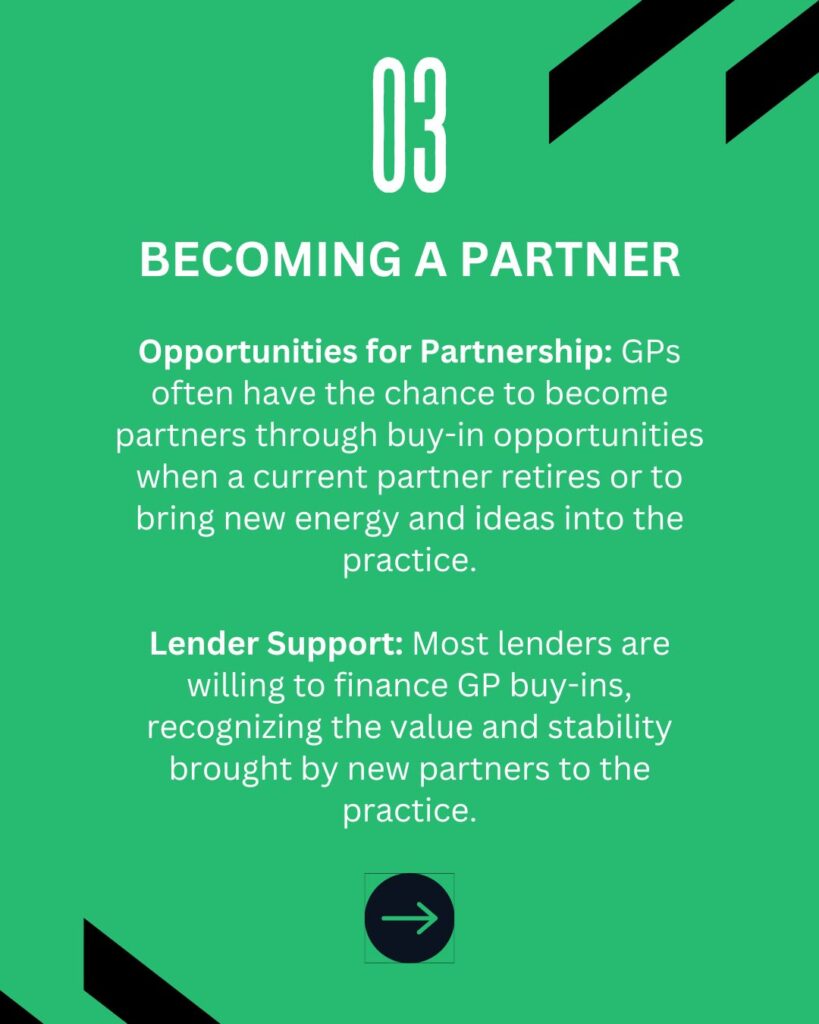
Click here to know about key mistakes to avoid: buying or starting a practice
The negatives of becoming a GP partner
You will shoulder more of the responsibility. Unlike being a salaried GP, you are responsible for the running of the practice and will have extra duties as a partner.
If the practice has any loans in the partnership name, you will be jointly and severally liable for that facility once you become a partner. Make sure you understand the full financial position at the practice.
What are the other important factors to take into account?
Partnership agreements make sure that you sign an up-to-date copy of the agreement once you become a partner. This will set out their rules and expectations at the practice.
Once you become a partner, you are no longer an employee. You will need to understand sickness, annual leave entitlement, paternity/maternity leave and how the practice deals with any disciplinary matters.
Setting up a new primary care practice
When you are setting up a new General Practice it can be both rewarding and liberating, especially if you are setting up your own private practice. Going private frees you from a lot of the burden that is accompanied by NHS regulations and allows you to spend a lot more time with your patients. Being a private practice means that you do not have any target to meet or any QOF (Quality and Outcomes Framework) points and a lot less government interference with your business.
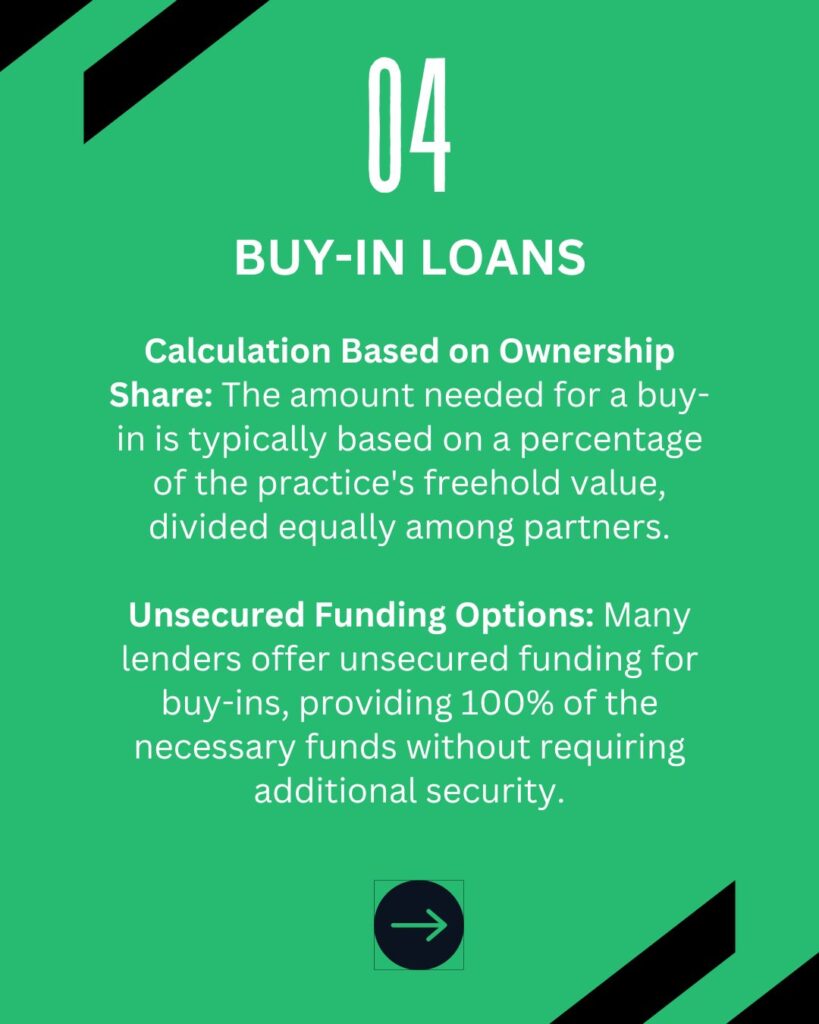
Click here to check our webinar on how to set up a profitable private practice
Funding for your GP clinic
Finance for medical equipment
Whether you are a new start-up or you need funding for your already-established primary care practice, you will need a range of equipment. This equipment can take quite a toll on your expenses.
The type of equipment you may need will include:
- X-ray equipment
- Equipment sterilizers
- IT equipment
- Practice room equipment
New or used?
Good quality equipment doesn’t always necessarily mean new equipment, the goal is to get good quality equipment which can also be used. Many business owners miss out on potential savings because they believe that they have to go for brand new equipment.
This is not the case, especially when you are a start-up business, buying good quality used equipment will help you buy the equipment you need for your practice for a fraction of the cost it would have cost you to get the same thing brand new in turn, saving you a lot of money.
Click here to read more about asset finance.

Contact us to find out more
Leases
Leasing equipment or a vehicle will allow you to get the latest equipment or asset you need without the hefty cost of owning it outright. Leading will give you the flexibility and freedom you need. Leasing also means that any maintenance that needs to be carried out is not your responsibility. These duties lie within the leading company therefore reducing costs for the equipment further down the line.

Hire purchase
Hire purchase is a great solution for you if you need equipment that you want to keep giving you good service for years and years. Hire purchase allows you up to five years to spread the most of most of the different types of equipment your general practice surgery will need.
Tax loans
VAT and tax demands can be a huge strain on any business, especially start-ups. Tax loans can help alleviate some of this stress by allowing you to pay back what is owed at manageable monthly costs.
Vat and tax loans will spread the costs of your taxes into affordable monthly payments there ensuring that you have a surplus of cash flow in your business rather than facing cash flow difficulties due to your tax bills.
Click here to read more about tax loans.
Practice loan
A practice loan is a loan solely based on your status as a doctor and your GP service and does not require any security. This loan can provide a relatively high level of funding at very favourable interest rates. Practice loans are not only for start-ups, you can use this loan can be used for many purposes including Buy-ins, cashflow support, any refurbishments or a capital injection for your business.
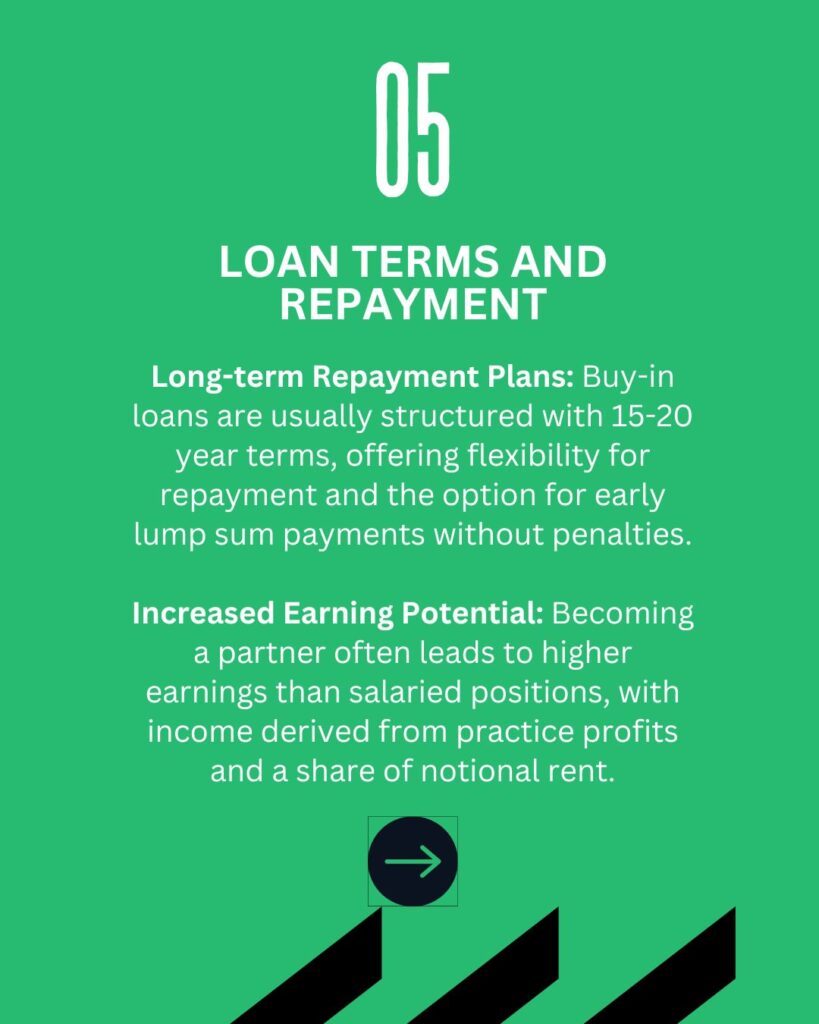
Working capital finance
Working capital is also known as net working capital. It is a loan that is taken to finance a company’s everyday operations. These loans are not designed to buy long term assets or investments. It is often used for specific growth projects; it is solely designed to boost the working capital available to a business.
Click here to read about a guide to working capital finance
Setting up your GP practice
Location
One of the first issues to be addressed by a practitioner is where the location of their private services is going to be carried out.
Demographics
There are two important sides that you should look into when looking at demographics. Firstly, you need to consider who your customers are and how important their proximity to your chosen location is. For a general practice, this is critical. You need to ensure that the local residents are affluent enough to continuously use your service.
The demographics you have of your target market should reflect the type of residents that are located in the area you chose your business to be in. The second side is to then look at the community. If your customer base will mostly be locals, which is highly probable for a GP surgery, does a sufficient percentage of the community population match your customer profile in order to support and sustain your business?
Foot Traffic, Accessibility & Parking:
For most retail businesses foot traffic is extremely important. Being a local business, you don’t want to be tucked away in a corner when people are likely to bypass you and not take any notice that your business even exists there.
You also need to consider how accessible the facility will be for everyone who will be using it, this includes customers and employees. If you are on a busy street you need to consider how easy it is for cars to get in and out of allotted parking spaces, you need to consider whether there even is adequate parking for your customers. As a GP practice, you need to also consider disability access.
Local competition
You will not only have other private practices that are your competition, but you will also have NHS practices. You need to know if these competing companies are located nearby, if so, how close are they? Sometimes if you are surrounded by other practices that are also private, comparison shopping may work in your favour depending on if your prices, reviews and services are more favourable than your competitors. You may also catch the overflow from existing businesses which could be a positive thing for you.
Proximity to other businesses
Look at the proximity of other businesses to your business. If you can see if you reap any benefits from these businesses being located next to you it will be great. You may be able to benefit from them by the customer traffic they generate. This is because those companies and their employees and even their own customer base could become your customers.

Contact us to find out more
Profit margins and scalability.
Although the aim for your practice is to help people, the end goal for your business is to make money, specifically, to make a profit and to pay yourself as well as any staff you have an income. The reality of your business will be, in the private sector, time is quite literally money and the more time you spend in your business, the more money you will be able to make. Unlike with NHS practices, you will only get paid for the specific services you provide.
When you are starting up, you will need enough income in order to cover the various set up costs including funding the premises, tax requirements as well as paying your staff and yourself a decent salary. Your profit will not be evident within the first couple of months at least, therefore, you will need enough funding to cover these costs over the first couple months while you start up.
Private or NHS
There is also the risk that your practice may not succeed in the way you think it will, which means that you should always be open to continuing your medical services with the NHS. The very popular perception that private GPs earning much larger sums of money is often untrue and should not be the primary reason to get up a private practice.
There are a variety of factors to consider when setting up in private practice. Remember, the grass is not always greener on the private side rather than the NHS. With the NHS, there is a lot more security for your business. It is also important to note that NHS indemnity schemes do not cover any private work therefore it is essential that all private practitioners have an adequate level of indemnity cover from one of the medical defence bodies. That being said, having a private practice can be quite lucrative.
Taxes
One of the first things you need to do within the first three months of starting your General Practice is to register with HMRC that you are starting a private practice that is fee charging. If you fail to do this, it is likely that you will be charged a fine.
Bookkeeping
Even though you are in the healthcare sector, at its core, your practice is a business that needs a separate business bank account to keep track of cash flow and taxation for all the doctors in the practice. You will need to develop a form of bookkeeping that is well organised and easy to use and understand.
Your GP services
Everyone needs a GP at some point, but what you are competing against is free NHS GPs. So, you need to make sure that you have a market for the primary care services you are offering. Most private general practices are in quite affluent areas where there is a high density of people who can afford the services that you will be providing.
Patients accessing your service will also expect a higher level of service since they are paying for a service that they could otherwise get for free. They will expect to get same-day appointments, longer appointment times and greater access with the doctor.
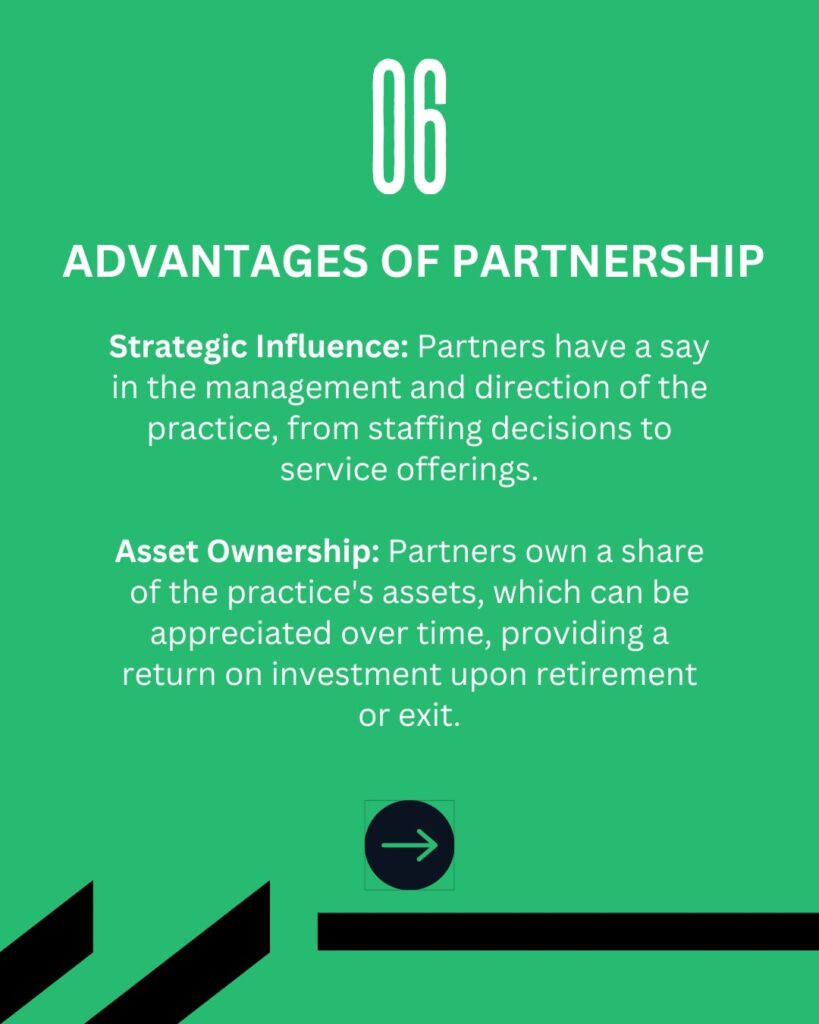
Applying for funding as a GP
When you apply for finance for your GP clinic, lenders will need to see from you:
- A personal profile which details your background assets and your monthly income/outgoings
- 3 years of financial accounts for the partnership
- 3 months personal bank statements
- Confirmation of the amount and the percentage that you are buying
- An indication of the salary that you will earn as a partner and what share of the notional rent you will receive
This information is needed by lenders to assess firstly, whether you can afford the loan against your present lifestyle/expenditure, and also that the existing business you are buying into or your plan for the business you intend to build is financially sound.
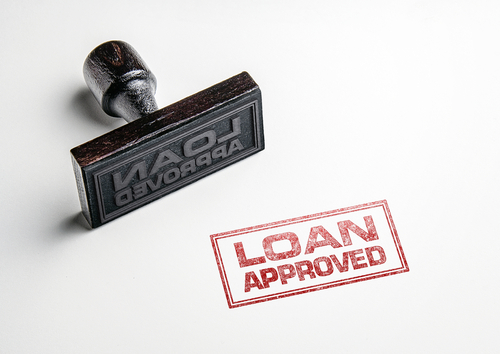
Contact us to find out more
Whether you are already working in private practice or considering setting up your own surgery we can help you find the financing option specific for your individual needs and circumstances. We can help with:
- Setting up a new practice
- Purchasing new premises
- Acquiring new equipment & assets
- Dealing with tax issues
- Sourcing working capital
- Accounts and tax
Click here to read our blog on how to finance a healthcare business.
Using a Commercial Finance Broker
We specialise in sourcing and negotiating the best terms for medical health professionals when they take out a business loan. Our team know exactly how to give your application the best chance of success. We know who to approach for the best rates. We know how to negotiate more favourable terms.
We understand how to raise finance for medical businesses.
If you’re looking to raise finance for a GP practice, Samera can help make sure you get the best possible deal for your business.
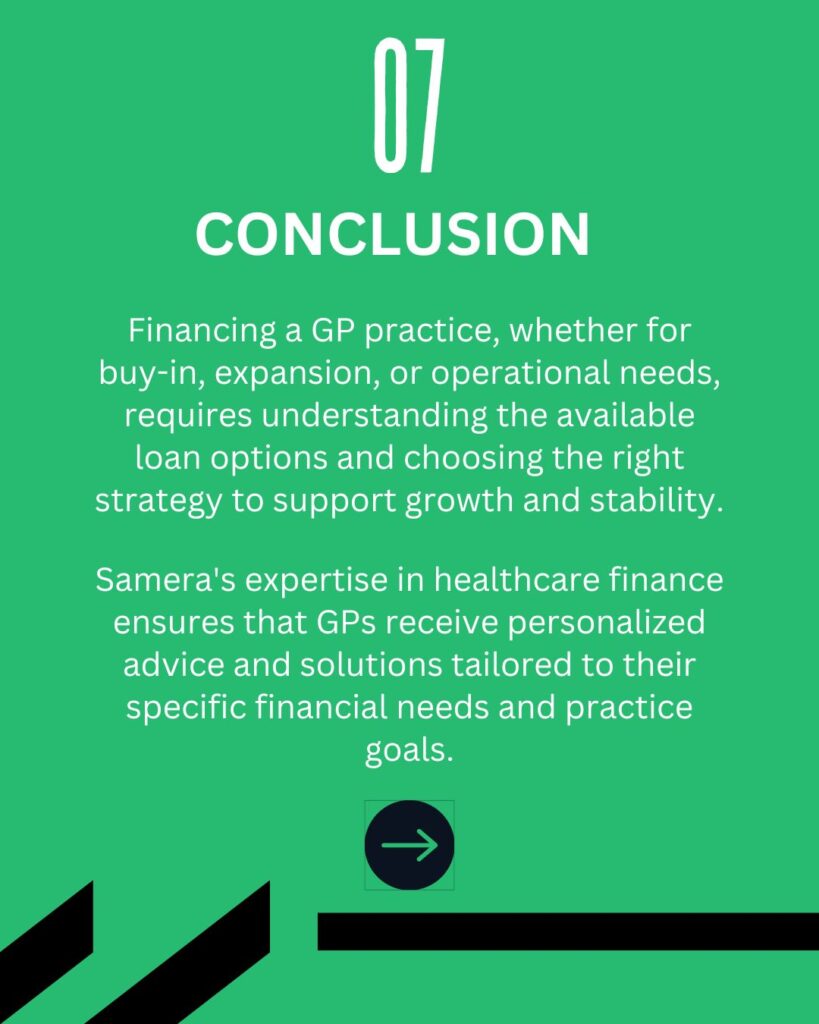
Click here to find out more about using a commercial finance broker.
Our Expert Opinion
“Understanding how GP practices are financed is key to securing the best terms available. This means using a broker that knows the GP market and also the banks requirements is key to funding your GP practice”

About the Author
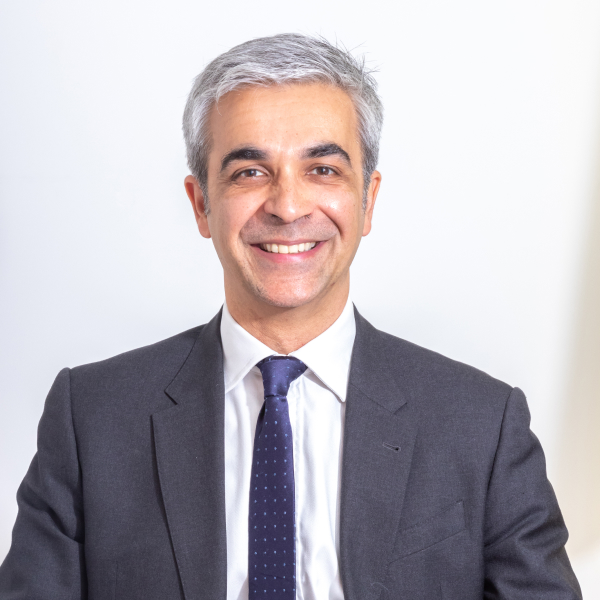
Arun Mehra
With almost twenty years of commercial experience and knowledge in Dentistry, Arun’s expertise is valued by hundreds of businesses across the UK. His financial acumen and know-how, along with his hands-on commercial expertise have helped clients, large and small, new and established to achieve great things.
Arun is the founder of the Samera Group, starting the business with just one client sitting at his father’s dining table. Fifteen years on, Team Samera now service hundreds of Dental clients, run exciting events, help clients raise finance, and are very active in helping clients buy or sell Dental practices.
Business Loans for Healthcare Businesses
We’ve been helping to fund the future of British healthcare businesses for over 20 years and our team are made up of former bankers with decades of experience in the UK’s healthcare lending sector.
You can find out more about working with Samera and the financial services we offer by booking a free consultation with one of the Samera team at a time that suits you (including evenings) or by reading more about our financial services at the links below.
For more information on raising finance for your healthcare business, including more articles, videos and webinars check out our Learning Centre here, full of articles and webinars like our How to Guide on Financing a Dental Practice.
Make sure you never miss any of our articles, webinars, videos or events by following us on Facebook, LinkedIn, YouTube and Instagram.



